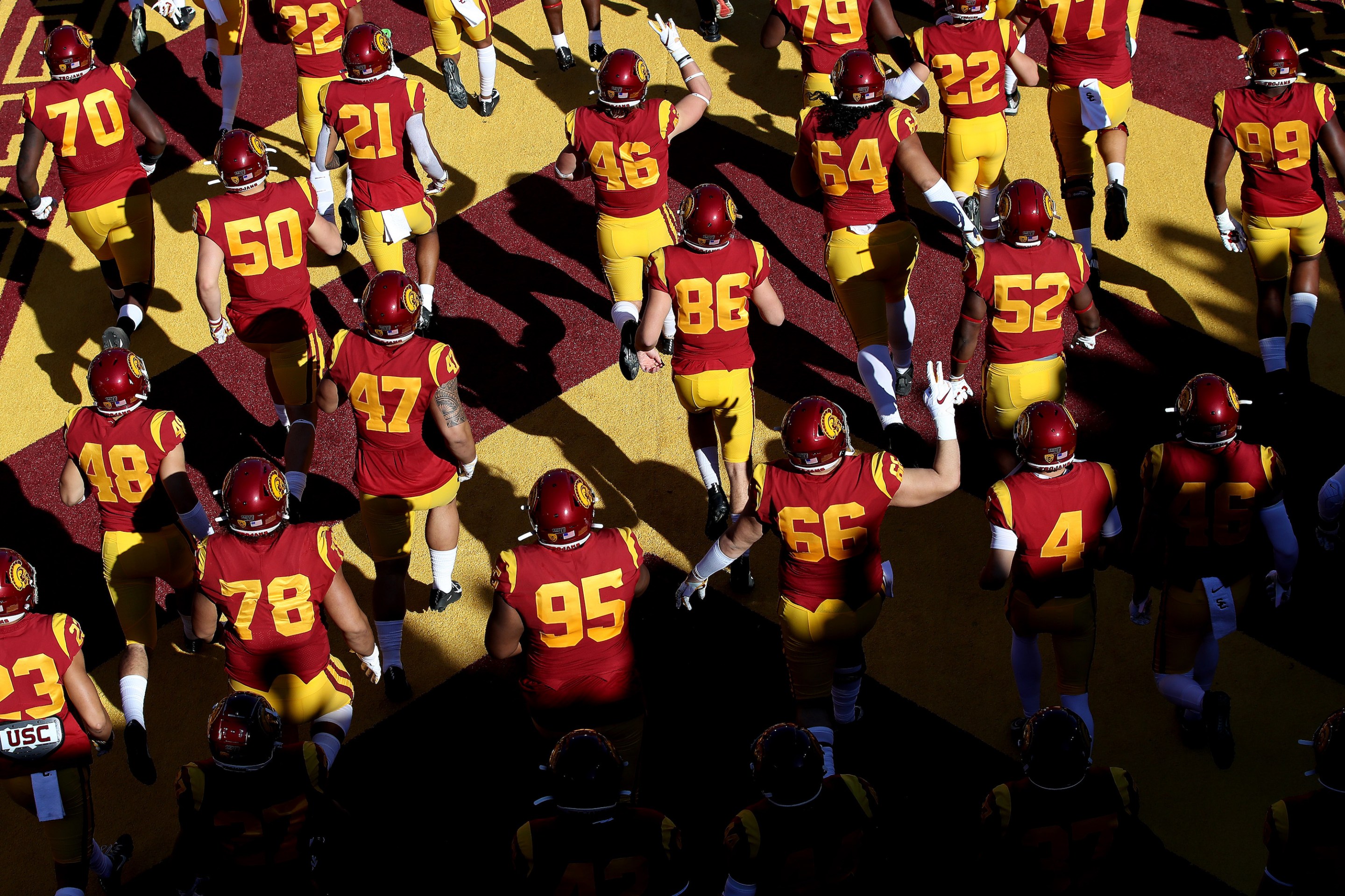College sports had been so comfortable for so long working in geologic time that the manic lurches of the past four weeks have caught all but the I-just-talked-to-athletic-director-X crowd by surprise. Oklahoma and Texas to the Southeastern Conference led to UCLA and USC to the Big 10, bloating two already chubby conferences and eviscerating two others, thereby causing traditionalists to weep for the Saturdays they once enjoyed and the knowledge that their programs would no longer be allowed dreams beyond their immediate vision.
Yes, we're looking at you, Oregon. Even with Phil Knight, you're not enough for the new big time.
Therein lies the undercard on the Big 10/SEC axis of gigantism. The truth is not that college football has grown its power to earn, but that the number of people with access to the trough has been significantly reduced. Not so much the number of teams with a chance to win a national title, mind you. That number hasn't changed at all. It's the number of teams who will draw sufficient attention week-in and week-out to make it worth Alabama giving up Utah State and Ohio State giving up Arkansas State. It's the conferences and their muscle, ESPN and Fox, finally acting on the annoying reality that there aren't enough nationally sellable games in any given weekend.
To be clear, we are talking about football here because this is all football moves. If you prefer basketball, baseball, women's sports, Olympic sports, name it, your chosen sport is at best riding a coattail and in the main collateral damage. Your school might even give up the whole athletic dodge because there are no more ways to get rich enough to cover the costs.
And yes, we're looking at you, Cal. Your athletic debt rivaled UCLA's, but UCLA lives next to USC and Cal lives next to Stanford, so UCLA gets a lifeline and Cal gets its shoes squeezed. And while we're at it, we're looking at you too, Stanford. Your wealth is in endowments, not through media rights deals or fanbase throw-weight. Your self-containment isn't what the new college order is about. Whether your future is in a Big 12 merger, an ACC merger, or life as an independent (brrrrrr), it'll be a sizable step down. As it is for the entire Pac-Leftovers.
Indeed, there are really only a few schools (and more on that in a moment) whose aspirations to remain in the top level of churn might be realized in the next burst of acquisitional mania, starting with Notre Dame. Its half-independent/half-ACC world is decreasingly sustainable, and the logic of joining the Big 10 is soon going to outweigh the benefits of Peacock. The others are Miami (Florida, not Ohio, smartarse), FSU, Clemson for reasons of travel, and Oregon and Washington mostly because of Nike's might and the Seattle media market. Even at that, the Big 10 doesn't really need to absorb Oregon and Washington because they know the SEC cares about them even less, and the new world order is about fewer slices in the pie.
The fewer-slices theory doesn't stop just because of the excision of the more profitable parts of the Pac-12 and Big 12. Indeed, the new prevailing theories include the Big 12 swallowing the Arizona schools, Colorado and Utah, and maybe while they're at it, Oregon and Washington, to become the Big 18. There are notions of a full-on merger of the Big 12 and Pac-12, as well as one that involves the ACC and Pac-12, but only after the SEC lops off Miami, Florida State, Clemson and a fourth program to make it the Big 20. Add the Big 17 (the Big 10, which is 14, plus the L.A. schools, plus Notre Dame), and you have reduced Division 1 from 130 schools to 55, and you've also reduced the need for the NCAA at all. At this point, the NCAA is everything that isn't football anyway, plus it's lousy mall cops, plus nobody fears it anymore.
Is this good? In the long term, no. Opportunities are decreased, sports wither at the lower levels, and in truest capitalist form, the programs who survive now might be next on the block if they can't keep earning at the same rate as their larger brethren. And yes, we're looking at you, Vanderbilt, and you too, Maryland. And you too, Rutgers and Mississippi State. You're riding along, too.
But there is an upside. It finally means we can stop calling these operations "schools" at all. The NFL model has finally come home to roost, and everything that is football is finally stripped of its traditional/faux-lofty/bullshit trappings and reduced to what it really is: naked viable inventory for whatever is left of sports television, or television at all. It doesn't need the fig leaf of academic progress any more than it needs the plastic foliage of the old hundred-dollar handshake. It isn't the nobility of college sports that have been crushed here, but the notion that maintaining the illusion matters any longer.
Academic progress has been essentially unenforceable anyway except by those few schools that have to pretend to care about that nerd in the president's office, and in a world defined solely by money without anyone monitoring nonsense like class attendance, the need to care about even the myth of education is now gone. Pretty soon, even academic schools will be weaponized by recruiters as a reason to avoid that school to come to the pro program at State A&M. And in a fight between maintaining educational requirements and keeping up the beachfront property payments—well, you know who wins that.
So what have we lost? The Big 10 isn't more evil today, any more than the SEC was more evil when it grabbed Texas and Oklahoma. They are simply following the road they have been paving for the last 20 years. Missouri and Texas A&M are like Maryland and Rutgers in that they were runway lights for the future that is today. The next round, maybe in 10 years, will be culling the herd of insiders to get to a rounder number like 50, or maybe even 40, thus making the matter of dividing the pie that much easier. After all, the Pac-12 was unassailable as a unified concept until it wasn't, so but-me-no-buts about traditional Big 10 or SEC schools. There are programs that bank and programs that bank less, and the ones that bank less will be jeopardized next because wealth doesn't run downhill any more, and maybe never did.
In sum, college football is embarking on the next step in an ecosystem based roughly on soccer but with one key distinction: relegation without the possibility of promotion. Last ones standing enjoy the pie.






